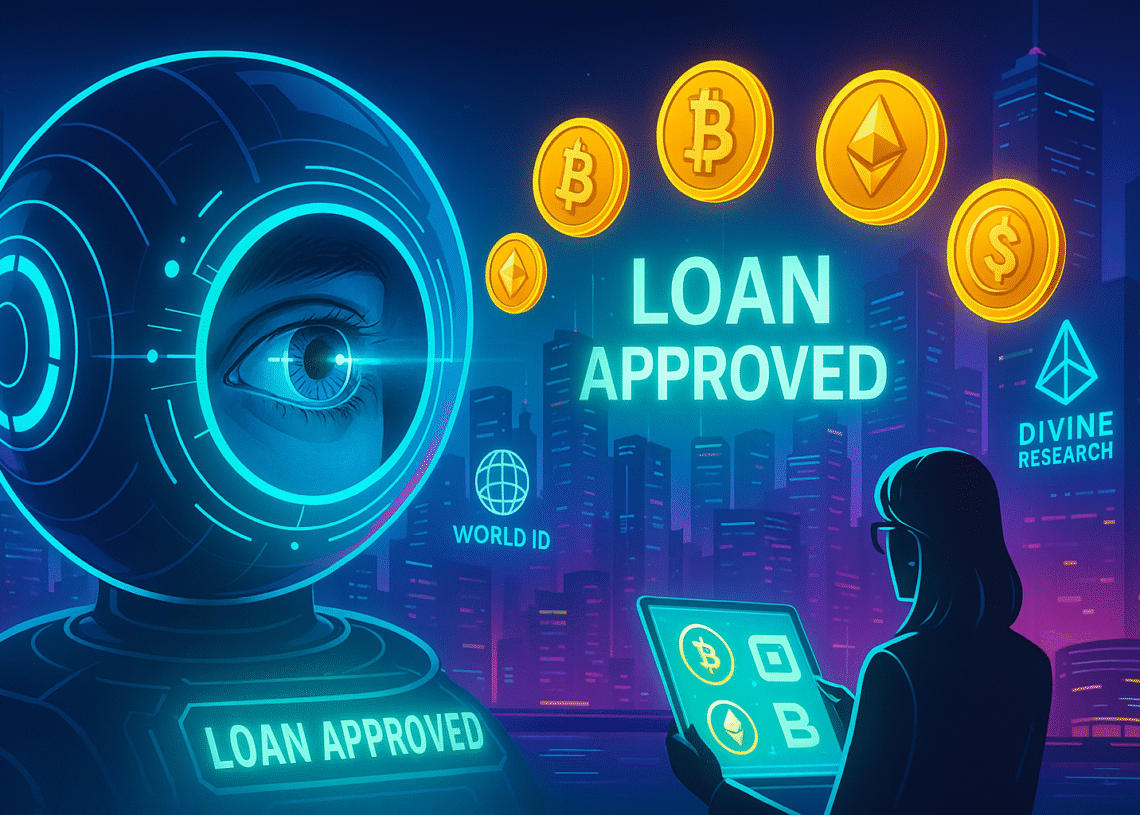In a bold move that’s shaking up the decentralized finance landscape, Divine Research has begun issuing $30,000 unbacked crypto loans using World ID, Sam Altman’s controversial identity protocol developed under the Worldcoin project. This marks one of the first real-world deployments of World ID in financial services — and it’s already drawing praise, concern, and heated debate across the crypto industry.
According to a report by the Financial Times, the firm is leveraging World ID as a way to ensure each user is a unique, verified human before granting access to unsecured credit. The concept is simple but radical: by confirming a person’s digital uniqueness through World ID’s biometric orb verification, Divine Research argues it can sidestep traditional collateral requirements and offer loans with far lower risk of fraud.
A Subtle but Radical Shift in Web3 Lending
At its core, this experiment represents a significant turning point for both DeFi and identity tech. Historically, uncollateralized crypto loans have been viewed as dangerously unstable, given the irreversible nature of blockchain-based transactions and the anonymity of users. But World ID, with its promise of sybil-resistance — the ability to prove you are a unique person without revealing your actual identity — changes the equation.
Here's what's fascinating:
— GC Cooke (@GCcookeHQ) July 23, 2025
Lending against Bitcoin is exactly how stablecoins work.
Crypto as collateral for dollar liquidity.
JPMorgan just validated the entire model. pic.twitter.com/7ELasrXUtg
According to Divine Research’s official communication, each qualified user who verifies through World ID is offered a loan of up to $30,000, with no crypto or fiat collateral required. Repayment terms are flexible and tied to behavioral indicators and network reputation, not traditional credit scores.
This approach challenges the prevailing models in decentralized lending, which rely on overcollateralization to manage risk. Projects like Aave and Compound typically require users to lock up more value than they borrow, limiting accessibility for underbanked populations — something Divine aims to fix.
Risk, Regulation, and Reactions
Naturally, such a leap has triggered alarm bells. Critics argue that combining unbacked loans with biometrics introduces a new kind of systemic risk — especially if the borrower base defaults en masse or if the identity layer itself is compromised.
Privacy advocates have long raised concerns about World ID, which involves scanning users’ irises to generate unique identifiers. Although no biometric data is stored on-chain, many in the crypto community remain wary of biometric centralization — especially given Worldcoin’s ties to OpenAI CEO Sam Altman.
Even some crypto-native developers question the logic. As one anonymous DeFi researcher commented, “The concept of sybil-resistance isn’t the same as creditworthiness. Just because you’re a real person doesn’t mean you’ll repay your debt.”
Despite this, proponents argue the model could represent a breakthrough in financial inclusion. Millions of people worldwide are excluded from traditional credit systems due to lack of identity documentation or banking access. By relying on World ID, Divine’s approach could unlock capital for entire demographics previously overlooked by both TradFi and DeFi.
What This Means for World ID’s Adoption Curve
Until now, World ID has been primarily seen as an infrastructure tool — a passive way to verify humanness for airdrops, governance, or spam prevention. But with this development, it steps directly into the heart of economic coordination.
This could accelerate the adoption curve for World ID, as more projects seek to integrate unique-human verification without compromising on privacy or decentralization. It also strengthens the case for biometric identity solutions as viable rails for real-world applications.
However, the success of this initiative will hinge on the repayment behavior of users and the system’s ability to withstand fraud or manipulation. If Divine Research can prove this model works at scale, it may ignite a new generation of trust-minimized lending protocols rooted in identity rather than capital.
Final Thoughts: Can World ID and Divine Research Rethink Crypto Credit?
The launch of unbacked loans via World ID is either a turning point or a ticking time bomb for crypto lending. Divine Research is placing a large bet on the power of verified human identity to reshape risk management — and potentially open the floodgates to decentralized credit access for the masses.
But the crypto space has seen many ambitious ideas fall apart when theory meets execution. The next few months will reveal whether this model can hold — or whether identity, even verified by iris scan, just isn’t enough.










